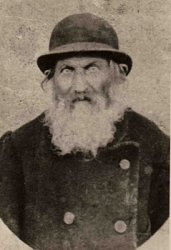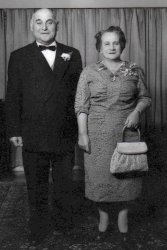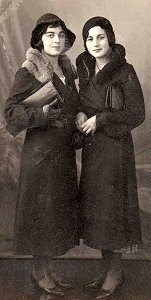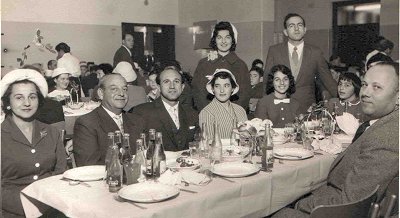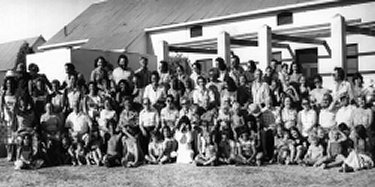|
|
Sachar Family |
|
What follows are photos from the South African branch of the family who distinguished themselves in business and philanthropic pursuits. The older generation were all born in Kupiskis and the photos of their home and backyard well as well as their friends can be found below. The next three photos below were
donated by the late Hilda Sachar Geffin and her sister Ida Sachar Schaverin, of
Cape Town, SA. whose parents were David Sachar and Chaya Zieper. The first
two photos represent a group of friends that the Sachar sisters either were
related to, grew up with or went to school with. Where the married names
of the girls are known, they have been put in parentheses. A number of
these girls did not survive the Holocaust. |
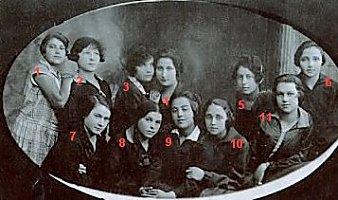 |
|
![]()
Back row, left to right - 1, Lucy Musikant; 2, Nechamke Friedman (Finkel); 3, Henke Milner; 4, Frume Bedil (Herring) Middle row, left to right - 5, Miriam Sachar (Fendel); 6, Shotske Sachar (Hilda Geffin); 7, Ester Keipffe; 8, unknown Front row, left to right - 9, Dina Bedil (Givon); 10, Hindke Goldin (Shatt); 11, Shimichke Smidt |
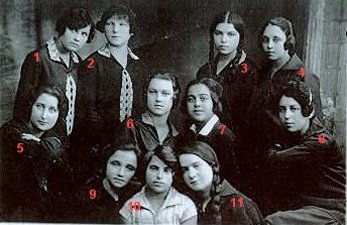 |
![]()
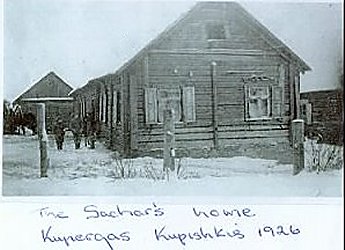 |
|
This is the Sachar home, which was located on Kupergas gatve (or street) in 1926. It was a wooden frame structure, like most in Kupiskis, with roofs made of tin or, in some cases, the older ones were made of thatch, a great fire hazard. The home had an outdoor well and garden. According to Velve Sachar, he bought the house, which was located near Dvora Gurevic's brick house in a small lane next to Karesh the Fisherman, from Leib Brozin. Another Sachar property was at 45 Gediminas gatve, which was a main thoroughfare in Kupiskis. |
| The family of Yitzhak Sachar and his wife Roche
Sachar was a large and diverse one.
The family later left Kupiskis and settled quite comfortably in |
|
|
Yitzhak Sachar in Kupiskis |
|
|
| David Sachar and his wife Chaya Zieper, taken in |
|
|
|
Sisters, Ida Sachar Schaverein and Hilda Sachar Geffin,
daughters of David and Chaya Sachar, taken in Kupiskis
|
| Some of the grandchildren of Yitzhak Sachar
taken in 1927
in Kupiskis
L to r: Israel Barron, son of Eta-Hinda Sachar Barron; Ida Sachar (Schaverein), daughter of David Sachar; Vittel-Rokhlia Sachar (Berman), daughter of Movsha-Kussel Sachar; Hilda Sachar (Geffin), daughter of David Sachar; Miriam Sachar (Fendel), daughter of Velva Sachar; and Issy Sachar, son of Velva Sachar |
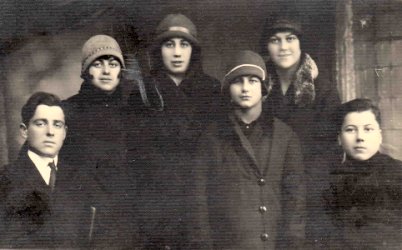 |
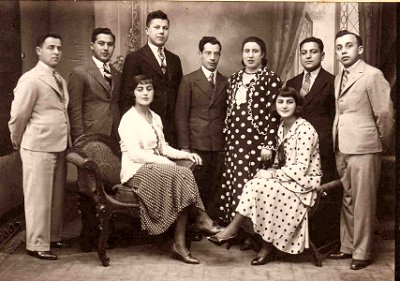 |
Some of the grandchildren of Yitzhak Sachar taken after
they had migrated to Cape Town, SA.
L to r: Israel Barron, son of Eta-Hinda Sachar Barron; Max Sachar, son of David Sachar; Ida Sachar Schaverein, daughter of David Sachar; Manual Sachar, son of Velva Sachar; Herschel Berman and Vittel-Rokhlia Sachar Berman, daughter of Movsha-Kussel Sachar; Ida Sachar Geffin, daughter of David Sachar; Barney Barron, son of Eta-Hinda Sachar Barron; and Manuel Sachar, son of Eliyahu Sachar |
|
|
|
Sachar family at a
wedding in L to r, Standing:
Rosa Geffin Kolevsohn, (daughter of Hilda Sachar Geffin); Bennie
Geffin, (son of Hilda Sachar Geffin); |
![]()
|
The well behind the Sachar house, 1926 |
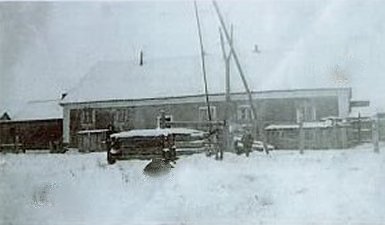 |
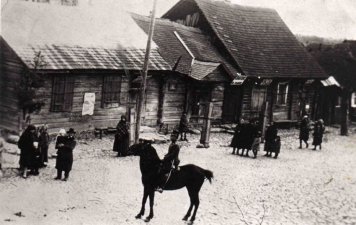 |
Sachar Home, located on the main thoroughfare in Kupiskis at 45 Gediminas gatve Click on the photo to see a larger version |
![]()
| The wedding photo that follows is that of
Manual ben
Eliyahu
Sachar and Fanny bat Jacob Kolnik taken in 1943 in Cape Province, South Africa. |
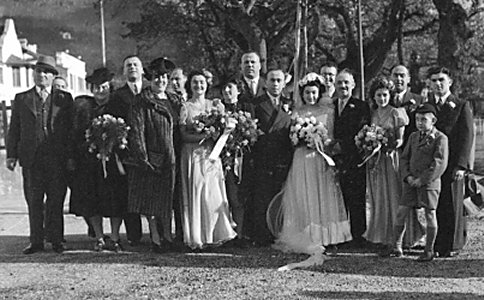 |
|
(photo donated by Elliot Sachar) Left to right are: David Sachar, Barney Baron (behind David), Chaia Zieper Sachar, Issy Sachar, Vittle Sachar Berman, Hershel Berman (behind Vittle), Freda Kolnik Sholk (Fanny's sister), Sheindel Schulman Kolnik (Fanny's mother), Manual ("Big Manual") Sachar (behind Sheindel), Manual ("Small Manual", groom) Sachar, Fanny Kolnik Sachar (bride), Moss Kolnik (Fanny's brother) (behind Fanny), Jacob Kolnik (Fanny's father), Tauba Kolnik Woolf (Fanny's sister), Max ben David Sachar, Julius ben David Sachar, Tefka Kolnik (Fanny's brother). Elliott Sachar, son of the bride and groom, recalls the close family ties the Sachar family had and the wonderful Sunday afternoon teas that the family attended in the apartment of Hershel and Vittle Berman in Woodstock. He also remembered that the Sachars and their relatives were an enterprising bunch as can be seen by their commercial ventures: Barney Sachar ran a retail clothing store in downtown Cape Town; Manual (Small Manual) Sachar ran a chain of clothing stores in Cape Town; Vittle Sachar married Hershel Berman (orginally Pergament) and ran a dry goods store in Woodstock; Issy Sachar ran a clothing store in Claremont; Julius Sachar became a doctor, then farmer and lives in Australia; and Max and Manual (Big Manual) Sachar were in business together and founded the well-known Grand Bazaars Stores. The Kolniks were also active in the commercial sphere as Freda
Kolnik married Bill Sholk and lived in Pretoria; Moss Kolnik was an Engineer and
lived in Durban and the Moss Kolnik Highway is named for him; Tauba Kolnik
married Bernard Woolf and lived in Rhodesia, now Muizenberg; and Tefka Kolnik
was an Optician and Pharmacist and now lives in Israel. |
|
|
|
This photograph was
taken at the Sachar family picnic reunion, a large-scale affair that was
attended by eighty-eight family members in December, 1979. The picnic was held at Dr. Julius Sachar's farm "Tierhoogte"
in Philadelphia, in the Western Cape of South Africa.
Click on the photo to
see a larger version with the names of the people included. |
|
(Photo and identifications: Elliot Sachar, the son of Manual (Small) Sachar and Fanny Kolnik, and Jackie Sachar, the son of Manual (Big) Sachar and Phyllis Bergman). |
![]()
|
This is a photograph of the Zieper family whose daughters Chaya and
Rochel-Beile married into the Sachar family and later went to South Africa. L to r: Unknown Zieper, Sara Zieper, Raize "Bobba" Zieper, Chaya Zieper Sachar, Yudel "Zeide" Zieper, Hirsh Sachar, and his mother Rochel-Beile Zieper Sachar. This was taken about 1900.
|
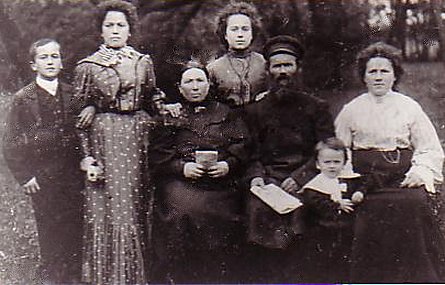 |
![]()
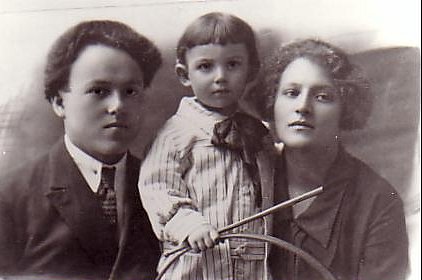 |
Photograph of Hirsh Sachar, his wife and child Marek, taken in Kupiskis
|
![]()
|
|
|
|
Much of what we know of the activities of the Kupishok Benevolent Society in Cape Town, South Africa, and the individuals who remained in Kupishok or left for South Africa, America, Israel and South America, is due to his extensive correspondence, society records and his autobiography which were mainly written in Yiddish. |
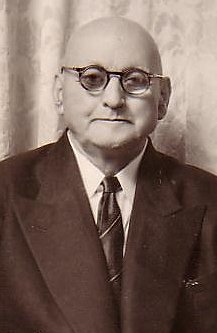 |
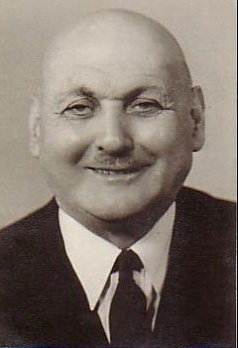
|
![]()
|
The wedding of Manual Sachar, son of Velve Sachar and Rocha-Beila Zieper, to Phyllis Bergman, the daughter of Samuel Bergman and Dora Gochin, of Port Elizabeth, SA, is shown in the following photograph. Attendees at the wedding are left to right: Issy Sachar, Joe Bergman (brother of the bride), Sheila Perl, Cynthia Sussman Shapiro, Velve Sachar (father of the groom), Dora Gochin Bergman and Sam Bergman (parents of the bride), Manual Sachar and Phyllis Bergman (groom and bride), Miriam Sachar Fendel and husband Louis Fendel, Cecille Bergman King (sister of the bride), Oppie Oppenheim, Sylvia Perl Sieff. |
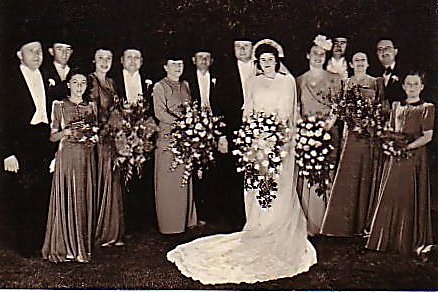 |
![]()
| Donated in memory of the Sachar and Zieper families by Phyllis Bergman Sachar, wife of Manual Sachar, and her children Jackie, Kenneth and Rachel Sachar |
![]()
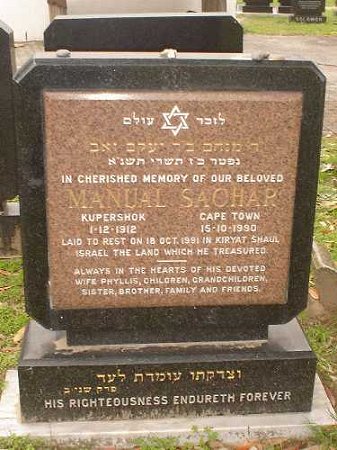 |
Manual Sachar
is buried in Israel, but his family put up a tombstone in Cape Town's
Pineland 2 Cemetery as a memorial. The tombstone states that Manny,
Menachem ben Yacov Zev Sachar, was born in Kupiskis. |
|
Kenneth Sachar generously shared this interesting article about the fate of Kupishoker Hirsch Sachar. It was originally written for his synagogue magazine, New North London Synagogue in Finchley, London, UK. Hirsch Sachar was a brother of Manual Sachar and a son of Velve Sachar and Rocha-Beila Zieper. |
|
Growing up in Cape Town I heard stories about my father’s childhood, how during the First World War the entire family was relocated by train to the east, of his freezing feet being warmed inside a relative’s jacket. On the journey they were starving and a farmer caught a cousin trying to steal potatoes in a frozen snow covered field. The farmer raised his sword above his head to kill the cousin but on some whim of compassion he relented and let him go. My father
had an older brother Hirsch who did not come with the family when they
joined my father in Cape Town. We were told that Hirsch had “missed the
train”. As a child I had an image of a man running frantically, almost
comically, suitcases in hand, alongside the train tracks, as the train
recedes into the distance. Kenneth
Sachar. January 2021. |

